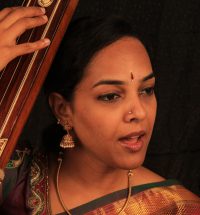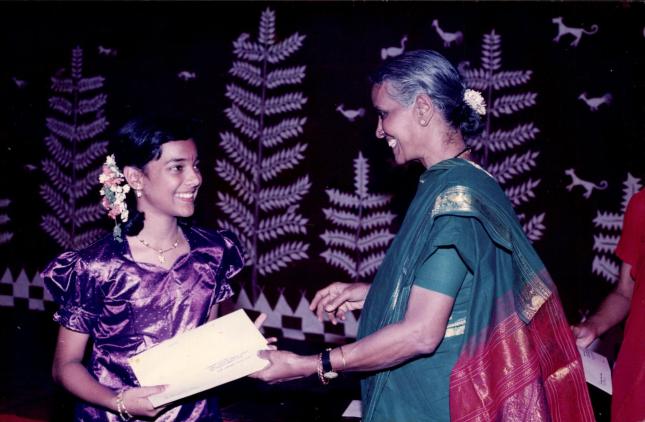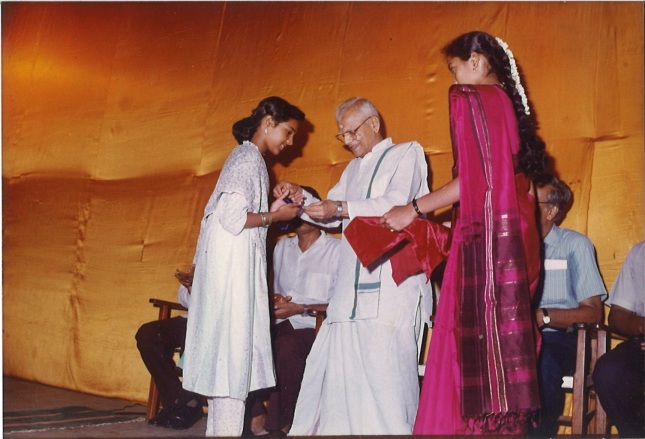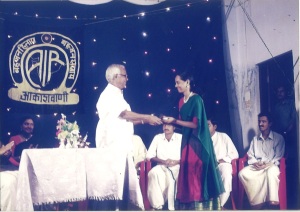My childhood memories of her as my senior at St Johns English School and then at Sri Sankara Senior Secondary School are vivid. She was a brilliant student who won every academic proficiency prize there was, year after year. She was also known for her outstanding singing, never failing to bring laurels to the school at inter-school competitions. I followed her career path with interest, until she all but disappeared from the Chennai music scene — to become a lecturer of music in Tirupati. It has now been about a year since she made a comeback, and a very successful one at that. ‘The response has been overwhelming’, in her own words. Not surprising, what with her erudition, sense of aesthetics and open-throated singing. Meet Dr Padma Sugavanam, a musician who is just as passionate about music pedagogy as she is about performance.
You were born in Ottawa but your parents moved back to Chennai so you could pursue music. At what age was this, and how did they identify your talent in music? Were there any other musicians in the family?
My grandmother and aunts were trained in music but did not perform in public, as was the practice then. My parents were not trained, but they respected and valued music. They noticed that I loved singing as a child and had to be pulled away from mikes! So they returned to India when I was hardly four years old, with the vision that I should learn music intensely and also develop a grounding in Indian culture.
I believe you had a flair for languages from a young age…
My mother’s family has a strong flair for languages — and I guess I picked up a bit of that. I am fortunate to have a French teacher in my mother and an award-winning Kannada writer in my mother-in-law. I grew up appreciating linguistics, poetry and even grammar!
My guru also encouraged me to learn Tamizh formally, and Sanskrit — which I fell in love with and later did a PhD in! I also learned Telugu while working in Tirupati, where it is the medium of instruction.
The structure and beauty of languages, which yield form and finesse to expression, specially fascinate me. I grew to love grammar — and Panini’s magnificent framework of language has influenced me the most.
Music revolves around sound, and each language as its own unique sound, its own voice. So language and music, I believe, are finely intertwined as vehicles of expression. Knowledge of language allows for an appreciation of poetry and deeper expression – it adds to musicianship. I find poetry and music equally beautiful and inseparable in the overall aesthetic experience.
Apart from performance, my love for languages has also helped tremendously in my academic research.
Listen to Padma’s rendition of Adi Sankara’s Kanakadhara Stavam as a ragamalika viruttam here:
Tell me about your training with Smt. Seetha Rajan.
I spent 20 years learning from Mami in the gurukula system, where I was with her for most of my waking hours. She had a unique perspective on pedagogy, musical grammar, compositions, aesthetics, etc. — and I could soak in all this, in an immersive gurukula experience. For instance, around 30 of us students once went to Sringeri for a camp with Mami. We learned music and immersed ourselves in it through the day under the trees beside the serene Tunga river, with only short breaks to walk and play in the river.
I developed critical thinking in music by discussing various topics with Mami, listening to and analysing music, doing research projects and conceiving musical productions with her. Mami had developed a unique pedagogy, influenced by the methods of the Hindustani system, in which she was trained. This helped build a strong foundation in both theory and practice, and give a solid grounding in traditional pathantara, while simultaneously opening the mind to new approaches and innovations.
You were academically brilliant too. So was music a difficult choice to make?
My family was always supportive and proud of my music but wanted me to get a mainstream degree for financial security, especially after I topped my school in class XII. However, I had decided to dedicate myself to music exclusively because I thought that many people would have the opportunity to become doctors and engineers, but only a few would have the opportunity to become musicians. I was very fortunate to have had the finest training in music, and the ‘less frequented path’ really excited me.
You won several tough competitions. You were double-promoted to AIR A grade at the age of 22, when you auditioned for a B-high. Clearly, you were doing very well as a performer. What made you take up an academic role? Do you think being away in Tirupati for more than 10 years took the focus away from performance for you? If you had remained in Chennai, perhaps you would have become much more popular as a vocalist?
For a young student, winning an AIR A grade is often a rite of passage that leads to a full-time career in music. I received it as a rare and unexpected double promotion at the age of 22, when I had only applied for a B-high. Several well-wishers advised me to take up performing full-time. But I had other plans.
I was tremendously inspired by scholars like Prof. N. Ramanathan and aspired for academic scholarship. I was awarded the prestigious Junior Research Fellowship from the UGC towards the end of my MA (Music), and I decided on a PhD. When I was selected, through a very tough selection process, for the job of a lecturer at Sri Venkateswara College of Music and Dance (Tirupati), I decided to take up the position — both for the love of academics and because of the lure of Telugu, which I wanted to learn.
Due to my involvement with academics, I performed very selectively for 10–12 years post my A grade. Only recently have I taken a leave of absence from college, and focused on performance and independent research projects. The response has been overwhelming — I was awarded the ‘Most Outstanding Vocalist’ in the junior category by the Music Academy in 2014, and promoted to the sub-senior category after my next performance. I completed a 17-concert tour of the US, followed by tours of Singapore and Malaysia. I have also debuted in several venues in India — Bengaluru, Ernakulam, etc.
Some of my contemporaries who focused on performing full-time have done very well, and reached senior slots in performance. I chose a different path, and I have no regrets. Staying outside Chennai definitely reduced performance opportunities, but I cherish the opportunities I got to serve Lord Venkateswara in Tirupati, while working in a college that is officially under Him.
Tell me about your experience as a lecturer. What subjects did you teach?
I come from a family of teachers and a musical parampara where teaching was given much emphasis. So teaching is very much a part of who I am, and I absolutely love interacting with students.
I taught vocal music for the bachelors and masters degree courses as well as some diploma courses. My students have been from diverse backgrounds, including Muslims and Dalits. Many came from an agricultural background, from remote villages with little or no exposure to Carnatic music. I had to specially adapt my teaching methodology to each individual, and I devised my own methods.
Tell me some things that you learnt by virtue of being a lecturer.
It is much more difficult to teach than to sing! Ramakrishna Paramahamsa has said that it is easy to solve your own problems and progress in your own sadhana, but it is much more difficult to understand and help solve problems of students with different dispositions, backgrounds, etc. and guide their sadhana.
As a music teacher, one must delve deep into every subtle nuance of songs, phrases and notes. One must teach the same phrase through multiple techniques — for students to pick whatever suits them. That takes a good amount of reflection and thought.
Since most of my students in college came from completely non-musical backgrounds, I had to break down musical abstractions into something relatable. I experimented with real-life imagery to help students visualise sound. For example, I would ask them to visualise the slow blooming of a flower while rendering a phrase in a gentle and caressing manner. My students responded well to this technique.
The chance to interact with a group of very capable colleagues and friends was another great bonus in Tirupati.
I’ve noticed that you write very well and elaborately. Is that a by-product of being an academic?
Thank you for the compliment! As I said before, I have a great love for language and expression, so it is only natural that I like to write. My perspectives on music are influenced by my background as a performer and an academic, and this has been appreciated by several rasikas.
Although I thought I had a flair for teaching, I did not know that my writing would also receive appreciation. I hope to write and publish in future — and not only papers in academic journals!
Tell me about your PhD research topic.
My PhD was a research on ‘Kohala’, a dramaturge and contemporary of Bharata. His works have been lost, and I had to triangulate indirect inferences from various unpublished manuscripts in Sanskrit, Telugu, Kannada, Malayalam, etc. It was very challenging — like breaking a secret code — and rewarding at the same time.
One author who has referenced Kohala significantly, the peerless aesthete Abhinavagupta, has deeply influenced my musical aesthetics. His aesthetics has inspired me to see music as a whole that is greater than the sum of its parts. It isn’t enough if I sing the parts (niraval, swaram, etc.) right; the big picture has other intangibles that I need to get right. This has been the biggest direct influence of my PhD research on my style of performance.
There’s some concern about Sanskrit dying out. What’s your opinion? Are you doing anything to cultivate interest in the language?
Sanskrit is the mother language of numerous Indian as well as Southeast Asian languages. During my travels, I have been absolutely stunned to see the extent of Sanskrit’s influence on local languages even in places like Maldives, Malaysia and Thailand. I think everybody with an interest in South Asian languages should study Sanskrit.
It is unfortunate that this beautiful language is now being politicised and communalised. It is also unfortunate that parents are not getting their children to speak in their own mother tongue. I see this both amongst NRIs and resident Indians living in urban areas. Language is the mother of culture, and future generations will irreversibly lose a tremendous cultural heritage of literature, poetry and music, if we don’t value our languages.
I appreciate countries like Singapore where it is mandatory to learn the mother tongue, and schools take great pains to engage teachers in Tamizh, Hindi, etc. for Indian children.
A lot of work has been going on in trying to bring about a resurgence of interest in the Sanskrit language. For people with interest, there are many avenues today — both physical and virtual — to learn Sanskrit. In our own way, the music field has also kept Sanskrit alive through numerous compositions. I recommend all my students to study Sanskrit, and I also personally give Sanskrit lessons to a few students.
One of the things that you’re interested in is bridal mysticism. Tell me more about it — how do the works of Annamayya and Nammalvar fall under the ambit of bridal mysticism? Who are the other composers involved? What aspects of their bhakti and music do you research?
Bridal mysticism is a form of establishing a deep emotional relationship with one’s ideal, often seen in our devotional poetry. The poet takes himself/herself as the bride of the Lord, and yearns for union with the Lord. Many poets and mystics have immersed themselves in such a state, and expressed love, yearning, pain, anguish of separation, etc. through beautiful lyrical poetry.
Andal’s poetry is a shining example of bridal mysticism. She fell in love with Rangamannar, and her Tiruppavai and Nachiyar Tirumozhi are records of her love and longing for the Lord.
I was particularly intrigued by male mystics who have immersed themselves in a similar state of mind and experienced bridal love for their ideal. We come across intense bridal mysticism in works as diverse as Sufi poetry, Jayadeva’s ashtapadis, prabandhas of Tirumangai Azhvar, pada-s of Kshetrayya, etc. How do these mystics have a feminine experience of longing and yearning and compose poetic gems in srngara rasa?
I wanted to research deeply into this — especially the compositions of Annamacharya and Nammalvar, who was a great inspiration for Annamacharya. I was fascinated by the wide variety of themes for the poetry, such as from the eyes of a mother helplessly seeing her daughter go mad with love and wilt away in separation and longing.
Srngara is one of the richest rasa-s, in terms of poetic possibilities and beauty. It opens up a vast canvas for beautiful characters, situations and fine lyrical imagery. Annamacharya’s srngara sankirtanas are fascinating masterpieces of poetry, exploring a myriad situations in love, all culminating at Lord Venkateswara. I believe that the present day hesitation with portraying srngara through music in performances is unnecessary. Srngara of this order is actually quite elevating and refreshing in this day and age, when we are bombarded by eros of a base and tantalising quality.

Padma receives the Most Outstanding Vocalist (Junior Category) award from the then TamilNadu Governer Shri Rosaiah at the Music Academy (1 January 2015)
Who did you do voice training with?
My guru, Seetha mami, was herself a great votary of voice culture, and was a stickler for open throatedness, good akara and enunciation. I incorporated these in my singing from a young age. After marriage, I learned some valuable voice concepts from my husband, who is trained in Hindustani music and has read about and explored voice techniques a fair bit.
Through my discussions with my husband, I realised that there is so much abstract technique to voice production — it is a deep science. In order to work on this aspect more seriously, I approached Shri Samarth Nagarkar, a prominent disciple of the legendary Pt Ulhas Kashalkar. He fundamentally transformed the way I relate to my voice and my singing. It was an unnerving experience initially, to unlearn the fundamentals of the way you sing — but very soon, I could see his technique work its magic.
Tell me about your family’s contribution to your music.
My family has been my biggest pillar of support. My parents wholeheartedly supported my pursuing a career in music, although they wanted me to have a mainstream education as well, as a net of safety. Giving their daughter to a gurukulam was not an easy task; my mother used to pick me up after music class almost every single night at 10:30 pm or so, when I was a school-going girl!
Now I am married into a family that is very musically oriented. My mother-in-law is trained in the lineage of Shri Mysore Vasudevachar. I often approach her for understanding the lyrics of Kannada pada-s better, selecting good ugabhoga-s, etc.
My husband and I actually met through our music circles. He is a student of Hindustani music, and we often discuss music. The way he critically observes my music, gives me new perspectives and challenges me has been tremendously enriching for my music.
Here’s an excerpt from Padma’s performance at the Cleveland Thyagaraja Festival:
Do you want to be known as a performer or as an academic? What are your aims?
I aspire for excellence in both performance and academics; I am equally keen on both. I would like to pursue excellence over popularity. Only if I am true to myself as an artiste can I be true to the audience. I present a style of music that’s true to my sense of aesthetics — a traditional pathantara with weighty sangatis in consonance with the raga bhava.
In teaching and research, I aspire to do seminal work. I want to bring out new pedagogies for music. I want to bring out hitherto unpublished musicological works, and shed light on great musicologists whose names might have been erased in history, even as hundreds of grantha-s languish in our manuscript archives.
For the next 5–10 years, I will focus primarily on performing and research. After that, I would like to spend more time on teaching, and prepare a good set of young minds for our music. I want to leave behind a legacy in music.
Padma’s profile photo credit: Kartik Pashupati





Super photos and write up madam.
LikeLike
I like your music and style. You are excellent in both. Although I am a doctor ( in Chemistry) and of Telugu origin I like Carnatic music very much. I would very much like to be your friend.
LikeLike